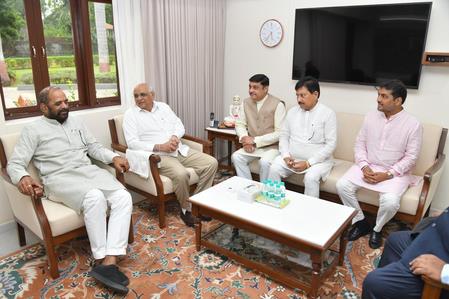
NCBC Reviews OBC Reservation Implementation In Gujarat
A high-level meeting, chaired by NCBC chairman Hansraj Ahir at Ahmedabad Annexy, was attended by member Bhuvan Kamal, Gujarat Chief Secretary Pankaj Joshi, Commission Secretary Mita Rajivlochan, and senior state officials.
The Commission reviewed the implementation of OBC reservations covering 146 communities in Gujarat, including the 27 per cent quota, issuance of caste and non-creamy layer certificates, and maintenance of roster registers.
It also examined educational, social, and economic welfare schemes for backward classes and stressed the need to ensure their benefits reach grassroots beneficiaries.
In Gujarat, Other Backward Classes (OBCs) comprise nearly 49.2 per cent of the state's population - 52 per cent in rural areas and 46.43 per cent in urban regions - a demographic figure based on data from the Justice Jhaveri Commission.
The state officially recognises over 160 OBC communities (some sources cite more than 146).
In response to this representation, Gujarat's Assembly passed legislation providing 27% reservation for OBCs in local self-governing bodies-including municipal corporations, municipalities, district, taluka, and gram panchayats-up from the prior 10%.
Furthermore, budgetary allocations targeting welfare for OBC communities have steadily increased: from approximately Rs 2,241 crore in 2022-23 to Rs 2,599 crore in 2023-24, with a proposed rise to Rs 2,928 crore for fiscal year 2024-25.
The NCBC praised the state government's welfare initiatives for OBCs and sought strict adherence to reservation policies in premier institutions and public sector organisations. Separate discussions were also held with officials from IIT Gandhinagar and Bank of Baroda on ensuring compliance with reservation norms.
The meeting was attended by Additional Chief Secretary (General Administration) Sunayna Tomar, Principal Secretary (Social Justice and Empowerment) Mohammad Shahid, IGP Gagandeep Gambhir, Collector Sujit Kumar, and senior officials from various departments OBCs hold immense political relevance in Gujarat, where they make up nearly half of the state's population and are spread across rural and urban constituencies, making them a decisive voting bloc.
The 27 per cent OBC reservation in local bodies, restored after a Supreme Court directive, has further sharpened their political weight. Both the BJP and Congress actively court OBCs - the BJP has consolidated support by projecting leaders from dominant OBC groups like Thakors and Kolis, while Congress seeks to revive its traditional KHAM (Kshatriya, Harijan, Adivasi, Muslim) strategy by re-engaging OBC communities.

Legal Disclaimer:
MENAFN provides the
information “as is” without warranty of any kind. We do not accept
any responsibility or liability for the accuracy, content, images,
videos, licenses, completeness, legality, or reliability of the information
contained in this article. If you have any complaints or copyright
issues related to this article, kindly contact the provider above.

















Comments
No comment